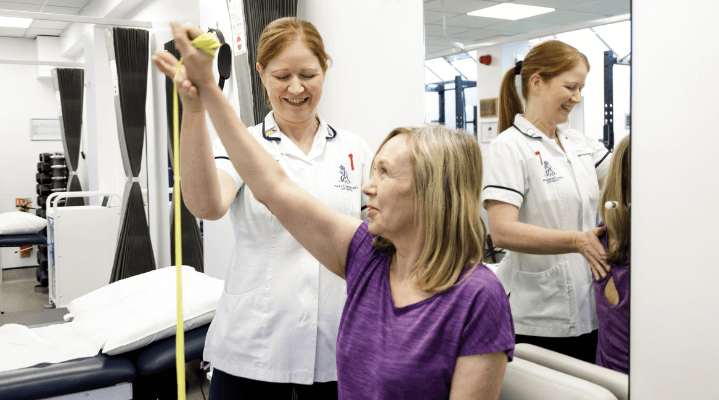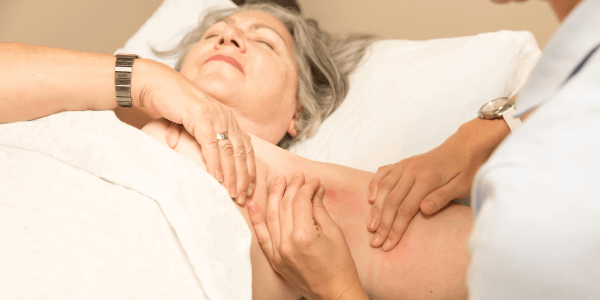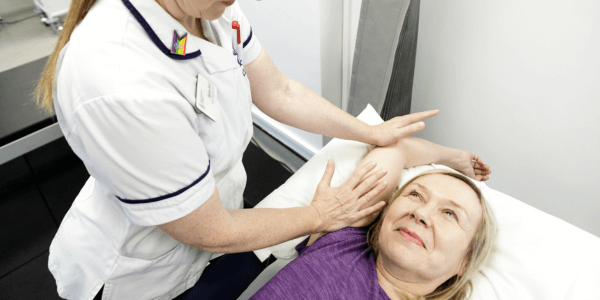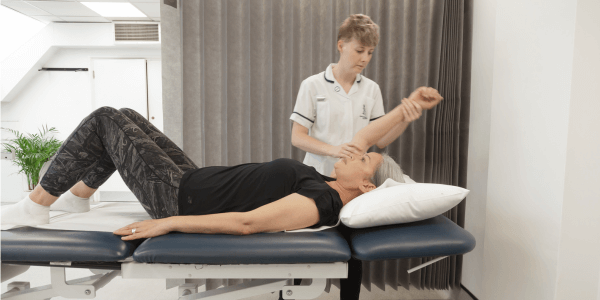Everything you need to know about Lymphodema after Breast Cancer Surgery

Before or after your breast cancer surgery, your consultant may have mentioned the condition lymphoedema to you. It affects 1 in 5 people who have treatment for breast cancer, either surgery or radiotherapy.
Before or after your breast cancer surgery, your consultant may have mentioned the condition lymphoedema to you. It affects 1 in 5 people who have treatment for breast cancer, either surgery or radiotherapy.
It can occur months or even years after your treatment so it’s important to be aware of what lymphoedema is, what the symptoms are and how you can minimise the risk of developing it. The condition is chronic which means there is no cure, but there are things you can do to help manage lymphoedema if you develop it. You can find out more about life after breast cancer in our health hub article.
We spoke to King Edward VII’s Hospital lymphoedema expert & physiotherapy clinical lead, Ashleigh Jordan, who explains lymphoedema can affect people following breast surgery, and how it can be managed.
What is lymphoedema?
During breast cancer surgery, some or all of the lymph nodes in the armpit are removed. When this happens, the flow of lymph fluid is disrupted, which can cause fluid to collect and lead to swelling in the arm – this is called lymphoedema.
The lymphatic system is a network of channels that spread throughout the body to carry a clear fluid called lymph. Lymph forms part of the immune system and helps to fight infections and drain excess fluid from the body.
When this system isn’t working properly, it can cause a build up of fluid, leading to swelling and lymphoedema.
Lymphoedema affects around 2 in 10 people following breast cancer surgery, with the risk higher in those with multiple lymph nodes removed. It can also follow radiotherapy that can cause scarring and blockages in the lymph nodes in the armpit. Lymphoedema can happen at any point following surgery or radiotherapy, and the risk remains for the rest of a patients’ life.
The condition can be very upsetting, and cannot be cured. However, physiotherapy can help to manage it.

What are the signs and symptoms of lymphoedema?
Swelling in one or both arms, in all or part of the arm can be a sign of lymphoedema developing following breast surgery. You may also notice your arms feeling heavy or achey, or your clothes, watch or jewellery feeling tighter than normal.
Lymphoedema occurs gradually, and early intervention is best. If you notice any swelling in your arm, at any point, speak to your breast cancer nurse or physiotherapist.
If you’re concerned about any of these symptoms, get in touch with your breast care nurse or your physiotherapist.
Physio treatment for lymphoedema
Should you develop lymphoedema, treatment will depend greatly on how severe it is. It’s therefore important to have an assessment with a specialist who can tailor a treatment plan to you.
Lymphoedema treatment involves gentle exercise to increase upper body movement to encourage drainage. It also involves a light skin stretching massage technique called manual lymphatic drainage. This helps to promote the movement of lymphatic fluid out of the swollen arm.
Manual lymphatic drainage should be carried out with a physiotherapist regularly, and you will also be taught self-management techniques to carry out at home. For example, placing a ball under the arm and performing gentle squeezes to encourage drainage. You will also be given recommended positions to keep the arm comfortably raised to also encourage drainage.
Other treatments that may be beneficial include bandaging and compression sleeves to prevent fluid build up and diet and weight management.

Managing lymphoedema
If you have lymphoedema, it’s important to do all you can to prevent further complications in the affected arm. The poor drainage caused by the condition puts you at a higher risk of infection. Therefore steps to help prevent infection or trauma to the arm include:
- Washing your hands regularly
- Showering daily and drying yourself well
- Keeping your fingernails clean
- Using clean razors
- Avoiding hot waxing as this may be too warm for the skin
- Trying to avoid anything that might cut or damage the skin when removing hair – gentle shaving or using an electric shaver is best
- Wearing gloves when using strong cleaning products
- Wearing gloves when gardening or carrying out other potentially dirty tasks
- Avoiding having blood tests, injections and blood pressure readings on the affected arm if possible
If you have any cuts or scrapes to your affected arm or hand, clean them straight away, use an antiseptic ointment and cover with a clean bandage or plaster. If you notice any signs of infection, including redness, pain, heat, increased swelling or a fever, contact your doctor straight away.
To prevent other complications, avoid wearing tight clothing or exposing your body to extremes of hot or cold temperatures, such as saunas, hot tubs, ice baths and ice packs.
In the days and weeks following surgery, avoid any vigorous or repetitive movements against resistance on the affected arm, such as scrubbing, pushing, pulling or carrying a heavy bag.
Cardio exercise and resistance training are beneficial in preventing lymphoedema. They shouldn’t be high intensity, but similarly, they shouldn’t be avoided. Your physio team will advise you depending on your individual circumstances.
More information
- The Breast Unit at King Edward VII’s Hospital has clinical nurse specialists, breast care nurse specialists, consultant radiologists, psychologists, pain and comfort management specialists, holistic healing partners and physiotherapists offering before and after surgery treatments.
- We offer breast screening, breast cancer treatment, breast reconstruction, nipple micropigmentation, physiotherapy for breast cancer related frozen shoulders and cording and genetic screening.
- We also offer all inclusive breast screening packages for those under 40 years old and 40+ years old.
- Our specialist Breast Therapy Service who specialises in lymphodema management is available to book directly without a referral. You don’t have to have had your treatment with us to book sessions with them










